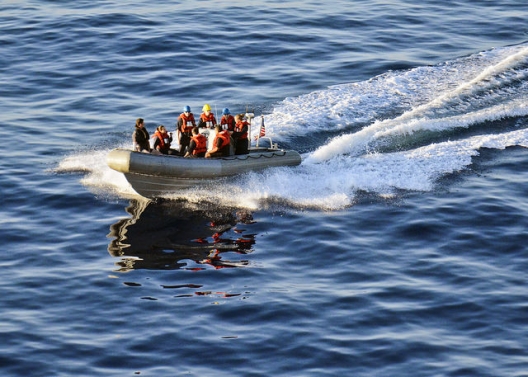 Facing criticism for her steadfast commitment to an open-door refugee policy, German Chancellor Angela Merkel in a recent press conference quoted the first clause of the first article of Germany’s constitution, which states that “Human dignity shall be inviolable.”
Facing criticism for her steadfast commitment to an open-door refugee policy, German Chancellor Angela Merkel in a recent press conference quoted the first clause of the first article of Germany’s constitution, which states that “Human dignity shall be inviolable.”
In searching for solutions to the current refugee crisis, this sentiment ought to guide the policies and efforts of any state or organization hoping to contribute.
One organization hoping to provide solutions is the North Atlantic Treaty Organization. At its recent summit in Warsaw, Secretary General Jens Stoltenberg announced the creation of Operation Sea Guardian, which he said will “work closely with the European Union’s Operation Sophia in the central Mediterranean, building on our swift and effective cooperation with the EU to cut lines of international human trafficking in the Aegean.” However, while NATO has the potential to be of great assistance, it must be cautious regarding its role in the Mediterranean and Aegean. In a situation already fraught with xenophobia and suffering, it must take an approach based on human rights and humanitarian principles, and avoid what some have called the potential “militarization” of the situation.
While this is easy to propose in principle, it may be harder for a military alliance to determine concrete steps that would allow for meaningful contributions while also ensuring such a focus. However, NATO’s description of Operation Sea Guardian includes several concepts that, if executed properly, could alleviate the refugee crisis. They are broad in scope, but contained within them is the latitude to take actions that would be both helpful and humane.
The four possibilities described in connection with Sea Guardian’s support for Operation Sophia are “providing situational awareness, countering trafficking and terrorism, upholding freedom of navigation and contributing to regional capacity building.”
If NATO is to uphold its commitment to human rights, the concepts of providing situational awareness and contributing to regional capacity building should be the dual cornerstones of their assistance. By concentrating on improving responsiveness to capsized or sinking boats, NATO could address an aspect of the crisis that is often overlooked by a Europe focused primarily on stemming the flow of refugees.
By the end of 2016, NATO plans to have five Global Hawk unmanned aerial vehicles (UAVs) stationed at Sigonella Air Base in Sicily. These will be able to patrol wide swathes of the Mediterranean, provide up-to-the-minute surveillance, and do so in all weather conditions, and so should be considered a key component of NATO’s assistance strategy. Such surveillance capability could easily be used to identify vessels in distress; information that could then be relayed to the Coast Guards of the nations in the best position to give assistance. It could also potentially be used to map routes and disembarking points commonly used for smuggling, information that local authorities could use to prepare for safer arrivals.
NATO also has the opportunity to help local authorities become more effective and capable. The communique that emerged from the Warsaw Summit, discussing support for Operation Sophia, specifically says that NATO could assist with “capacity building of the Libyan coastguard and navy, if requested by the legitimate Libyan authorities and/or the EU.” This is an offer that both the Libyans and the EU should accept. Libyan ships have an important role to play in responding to the refugee crisis, and NATO has both a wealth of maritime expertise and years of experience with similar training and capacity building. NATO could in fact create a dual benefit here; a well-prepared Libyan Coast Guard provided with real-time information relayed from a Global Hawk UAV would be able to effectively carry out search and rescue missions aimed at curtailing the humanitarian disasters that have plagued their coast recently. At an event in April hosted by the Atlantic Council, NATO Secretary General Jens Stoltenberg made the point that “In the long run, it is more sustainable to enable local forces to protect their countries than it is to deploy large numbers of our own troops.” In Libya, NATO has the opportunity to implement this philosophy, not to the defense of a country, but to the defense of an often overlooked and abandoned population.
Efforts combining capacity building and intelligence sharing, aside from the direct humanitarian benefits they could provide, also have the potential to shift the current paradigm surrounding efforts to address the refugee crisis. Instead of focusing on how to stem the tide, or how to persuade other countries to bear the brunt of the burden, Europe could learn from a NATO-led humanitarian-based response, and come to embrace the empathy and compassion displayed by Angela Merkel when she argued that “human dignity shall be inviolable”.
Spencer Grady-Pawl works in the Atlantic Council’s Transatlantic Security Initiative.
Image: A rigid-hulled inflatable boat from Standing NATO Maritime Group 2 (SNMG2), Oct. 6, 2014 (photo: Specialist Amanda S. Kitchner/US Navy)
